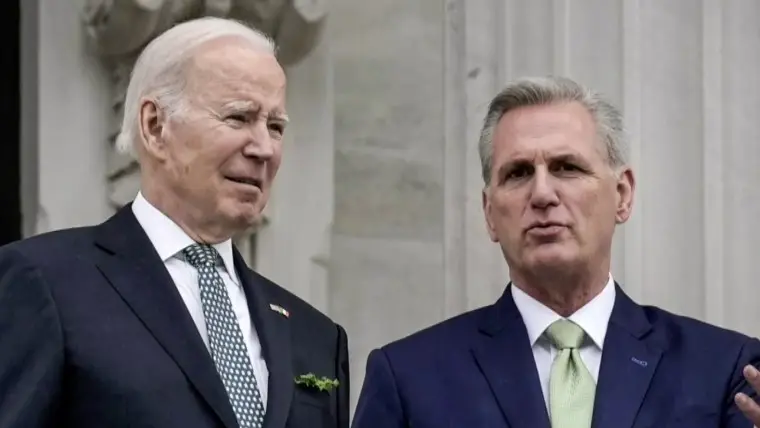
McCarthy's debt limit bill praised by GOP conservatives, but centrists are skeptical
WASHINGTON — House Speaker Kevin McCarthy's debt limit legislation was met with praise from right-wing members of the caucus and skepticism from centrist Republicans in swing districts.
The bill, which would raise the debt ceiling in exchange for some spending cuts, was warmly received by some of the 20 holdouts who tried to stop McCarthy, R-Calif., from winning the speaker's gavel — a positive sign for the prospects of passage in the GOP-led House, where far-right members tend to drive the hardest bargain.
"It looks pretty good so far," said Rep. Dan Bishop, R-N.C.
Rep. Bob Good, R-Va., an outspoken McCarthy critic, said he expects to vote for the bill. "I plan to be on board," he said.
Biden and GOP showdown over national debt ceiling
April 19, 202301:55Rep. Chip Roy, R-Texas, another early McCarthy holdout, said he was still reviewing it but, "I generally approve of the framework."
Does he have any concerns with the outline? "Not really," he said, even though there's more spending he'd like to cut.
"There's always more for me but you've got to work within the realm of what we can do and accomplish, and I think we've got a pretty good framework there," Roy said. "We just got to go through the details now."
The package was designed to include many overlapping demands of the far-right Freedom Caucus and the center-right Main Street Caucus, which span much of the conference's ideological spectrum.
But some Republicans in swing districts are more skeptical of the bill and it’s not clear there will be enough votes to pass it. Democrats are likely to unify in opposition to the legislation, which the White House has blasted as a hostage-taking gambit that risks debt default and would harm manufacturing jobs in the U.S., citing the repeal of clean energy funding. And McCarthy can only spare four Republican votes in his wafer-thin majority.
Swing-district Republicans are skeptical
In exchange for raising the debt ceiling by $1.5 trillion or through March 31, 2024 — whichever comes first — McCarthy's bill would bring federal discretionary spending down to fiscal 2022 levels with a 1% growth cap; it rescinds unspent Covid relief funds, cancels Biden's student debt forgiveness plan, nixes enhanced IRS funding and includes work requirements for able-bodied adult recipients of Medicaid and other federal aid programs.
Rep. Tony Gonzales, R-Texas, who represents a competitive district around San Antonio, said he is "undecided." He said the legislation still has "a long way to go" to secure enough support.
Rep. Nancy Mace, R-S.C., who represents a competitive district that includes Charleston, said she’s “currently leaning against voting for it,” citing its failure to balance the budget and more.
“I’m also worried about how it will affect green energy. In South Carolina we have a lot of solar — solar farms, solar panels, consumer and commercial. And what will that do?” she asked. “Will those policies in that package adversely affect the state of South Carolina? We’re still in the process of reviewing it but those are two of my initial when I look at it at a very high level. Those are the two concerns I have initially but we’re still — devil’s in the details.”
Rep. George Santos, R-N.Y., the scandal-plagued freshman who announced he's running for re-election in a district that supported Biden in 2020, is also not sold.
"The congressman is undecided," said a Santos aide.
Rep. Marc Molinaro, R-N.Y., another freshman in a competitive Biden-voting district, didn't take a position when asked about it.
"We're still working on it," he said.
And while far-right members generally sounded supportive Thursday, McCarthy could still lose support within that group as well. Rep. Matt Rosendale, R-Mont., wouldn’t say if he supports the bill. And Rep. Andy Biggs, R-Ariz., said he leans against it, explaining that “there are parts I like and parts I don’t like,” specifically the $1.5 trillion debt limit hike.
Roy said he needs to review the text to make sure the work requirements are “strong enough” and that the bill rescinds enough of the Inflation Reduction Act subsidies.
Even if the bill passes the House, it is dead on arrival in the Democratic-controlled Senate. Majority Leader Chuck Schumer, D-N.Y., has blasted it as a dangerous exercise in hostage-taking that could spark an economic meltdown and instead called for a bill that allows the U.S. to meet its obligations with no policy conditions.
House Democrats are threatening to use the bill against Republicans in the 2024 election, when they hope to recapture the majority.







